Unit 6, 7A牛津英语语言知识汇总
- 格式:doc
- 大小:40.50 KB
- 文档页数:4
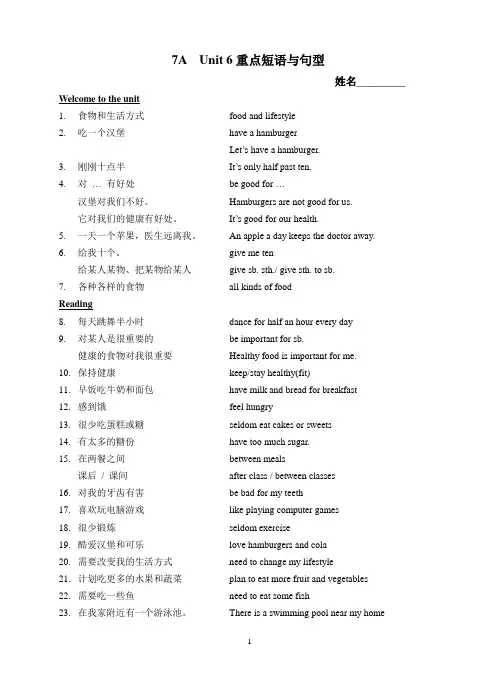
7A Unit 6重点短语与句型姓名_________ Welcome to the unit1.食物和生活方式food and lifestyle2.吃一个汉堡have a hamburgerLet’s have a hamburger.3.刚刚十点半It’s only half past ten.4.对…有好处be good for …汉堡对我们不好。
Hamburgers are not good for us.它对我们的健康有好处。
It’s good for our health.5.一天一个苹果,医生远离我。
An apple a day keeps the doctor away.6.给我十个。
give me ten给某人某物、把某物给某人give sb. sth./ give sth. to sb.7.各种各样的食物all kinds of foodReading8.每天跳舞半小时dance for half an hour every day9.对某人是很重要的be important for sb.健康的食物对我很重要Healthy food is important for me.10.保持健康keep/stay healthy(fit)11.早饭吃牛奶和面包have milk and bread for breakfast12.感到饿feel hungry13.很少吃蛋糕或糖seldom eat cakes or sweets14.有太多的糖份have too much sugar.15.在两餐之间between meals课后/ 课间after class / between classes16.对我的牙齿有害be bad for my teeth17.喜欢玩电脑游戏like playing computer games18.很少锻炼seldom exercise19.酷爱汉堡和可乐love hamburgers and cola20.需要改变我的生活方式need to change my lifestyle21.计划吃更多的水果和蔬菜plan to eat more fruit and vegetables22.需要吃一些鱼need to eat some fish23.在我家附近有一个游泳池。
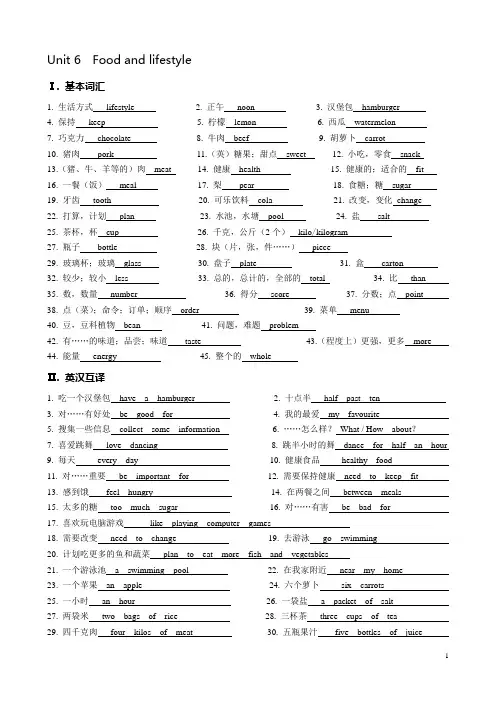
Unit 6 Food and lifestyleⅠ. 基本词汇1. 生活方式lifestyle2. 正午noon3. 汉堡包hamburger4. 保持keep5. 柠檬lemon6. 西瓜watermelon7. 巧克力chocolate 8. 牛肉beef 9. 胡萝卜carrot10. 猪肉pork 11.(英)糖果;甜点sweet 12. 小吃,零食snack13.(猪、牛、羊等的)肉meat 14. 健康health 15. 健康的;适合的fit16. 一餐(饭)meal 17. 梨pear 18. 食糖;糖sugar19. 牙齿tooth 20. 可乐饮料cola 21. 改变,变化change22. 打算,计划plan 23. 水池,水塘pool 24. 盐salt25. 茶杯,杯cup 26. 千克,公斤(2个)kilo/kilogram27. 瓶子bottle 28. 块(片,张,件……)piece29. 玻璃杯;玻璃glass 30. 盘子plate 31. 盒carton32. 较少;较小less 33. 总的,总计的,全部的total 34. 比than 35. 数,数量number 36. 得分score 37. 分数;点point38. 点(菜);命令;订单;顺序order 39. 菜单menu40. 豆,豆科植物bean 41. 问题,难题problem42. 有……的味道;品尝;味道taste 43.(程度上)更强,更多more 44. 能量energy 45. 整个的wholeⅡ. 英汉互译1. 吃一个汉堡包have a hamburger2. 十点半half past ten3. 对……有好处be good for4. 我的最爱my favourite5. 搜集一些信息collect some information6.……怎么样?What / How about?7. 喜爱跳舞love dancing 8. 跳半小时的舞dance for half an hour 9. 每天every day 10. 健康食品healthy food11. 对……重要be important for 12. 需要保持健康need to keep fit13. 感到饿feel hungry 14. 在两餐之间between meals15. 太多的糖too much sugar 16. 对……有害be bad for17. 喜欢玩电脑游戏like playing computer games18. 需要改变need to change 19. 去游泳go swimming20. 计划吃更多的鱼和蔬菜plan to eat more fish and vegetables21. 一个游泳池 a swimming pool 22. 在我家附近near my home23. 一个苹果an apple 24. 六个萝卜six carrots25. 一小时an hour 26. 一袋盐 a packet of salt27. 两袋米two bags of rice 28. 三杯茶three cups of tea29. 四千克肉four kilos of meat 30. 五瓶果汁five bottles of juice31. 两张纸two pieces of paper 32. 四片面包four pieces of bread 33. 五盒牛奶five cartons of milk 34. 八副眼镜eight pairs of glasses 35. 一盘鸡 a plate of chicken 36. 十张课桌ten desks37. 买蔬菜buy vegetables 38. 祖父的最爱Grandpa’s favourite 39. countable nouns 可数名词40. singular form 单数形式41. 一周少于三次less than 3 times a week42. 多于九小时more than 9 hours 43. 每隔多久一次how often44. 散步take a walk 45. 每天every day46. 需要多锻炼need to exercise more47. 吃更多健康的食物eat more healthy food 48. 点食物order food49. 行了,好吧all right 50. 一听可乐饮料 a can of cola 51. 苹果汁apple juice 52.……的总数total number of …53. 尝起来很好taste good54. a questionnaire 一份问卷55. 健康的生活方式healthy lifestyle 56. 开始一天start the day57. 给某人……的能量give sb. energy for58 整个下午the whole afternoon 59. 喝汤have soup60. 喝大量的水drink lots of water 61. 一杯牛奶 a glass of milkⅢ. 基本句型1. 埃迪,才十点半。
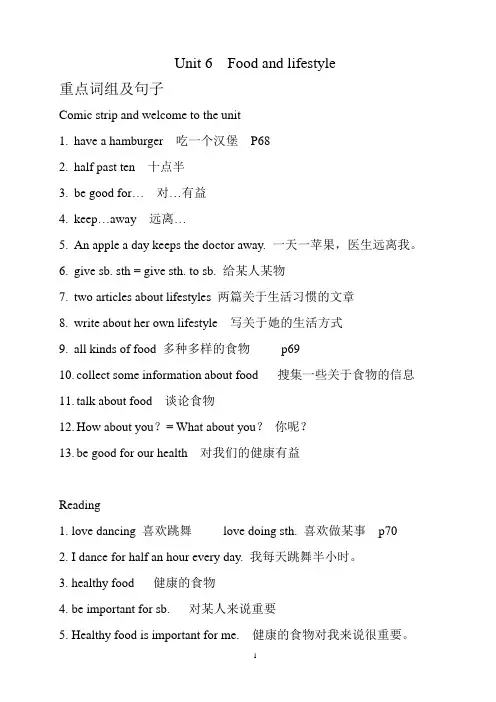
Unit 6 Food and lifestyle重点词组及句子Comic strip and welcome to the unit1.have a hamburger 吃一个汉堡P682.half past ten 十点半3.be good for…对…有益4.keep…away 远离…5.An apple a day keeps the doctor away. 一天一苹果,医生远离我。
6.give sb. sth = give sth. to sb. 给某人某物7.two articles about lifestyles 两篇关于生活习惯的文章8.write about her own lifestyle 写关于她的生活方式9.all kinds of food 多种多样的食物p6910.collect some information about food 搜集一些关于食物的信息11.talk about food 谈论食物12.How about you?= What about you?你呢?13.be good for our health 对我们的健康有益Reading1. love dancing 喜欢跳舞love doing sth. 喜欢做某事p702. I dance for half an hour every day. 我每天跳舞半小时。
3. healthy food 健康的食物4. be important for sb. 对某人来说重要5. Healthy food is important for me. 健康的食物对我来说很重要。
6. need to do sth. 需要做某事7. keep fit = keep healthy 保持健康8. I need to keep fit. 我需要保持健康。
9. have …. for breakfast 早饭吃…10. have milk and bread for breakfast 早饭喝牛奶,吃面包11. eat fish and vegetables 吃鱼和蔬菜12. feel hungry between meals 在两餐之间感觉到饿13. I seldom eat cakes or sweets. 我很少吃蛋糕或糖果。
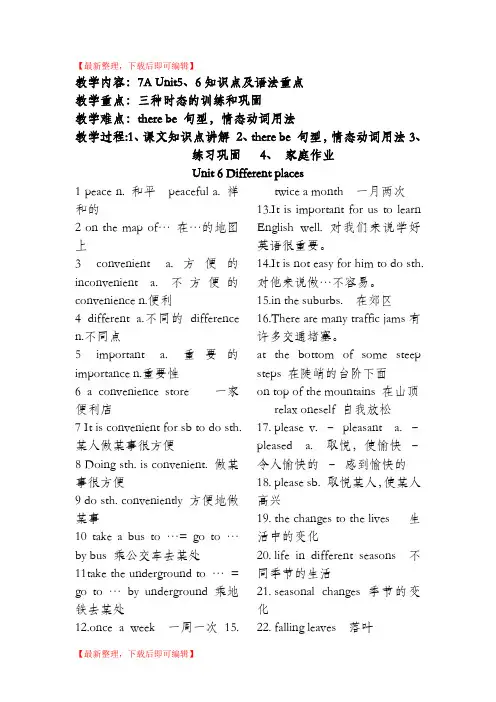
【最新整理,下载后即可编辑】教学内容:7A Unit5、6知识点及语法重点教学重点:三种时态的训练和巩固教学难点:there be 句型,情态动词用法教学过程:1、课文知识点讲解2、there be 句型,情态动词用法3、练习巩固4、家庭作业Unit 6 Different places1 peace n. 和平peaceful a. 祥和的2 on the map of…在…的地图上3 convenient a.方便的inconvenient a. 不方便的convenience n.便利4 different a.不同的difference n.不同点5 important a. 重要的importance n.重要性6 a convenience store 一家便利店7 It is convenient for sb to do sth. 某人做某事很方便8 Doing sth. is convenient. 做某事很方便9 do sth. conveniently 方便地做某事10 take a bus to …= go to …by bus 乘公交车去某处11take the underground to …= go to …by underground 乘地铁去某处12.once a week 一周一次15.twice a month 一月两次13.It is important for us to learn English well. 对我们来说学好英语很重要。
14.It is not easy for him to do sth. 对他来说做…不容易。
15.in the suburbs. 在郊区16.There are many traffic jams有许多交通堵塞。
at the bottom of some steep steps 在陡峭的台阶下面on top of the mountains 在山顶relax oneself 自我放松17. please v. –pleasant a. –pleased a. 取悦,使愉快–令人愉快的–感到愉快的18. please sb. 取悦某人,使某人高兴19. the changes to the lives 生活中的变化20. life in different seasons 不同季节的生活21. seasonal changes 季节的变化22. falling leaves 落叶23. fall -- fell –fallen 落下24. This pair of gloves is black. 这副手套是黑色的。
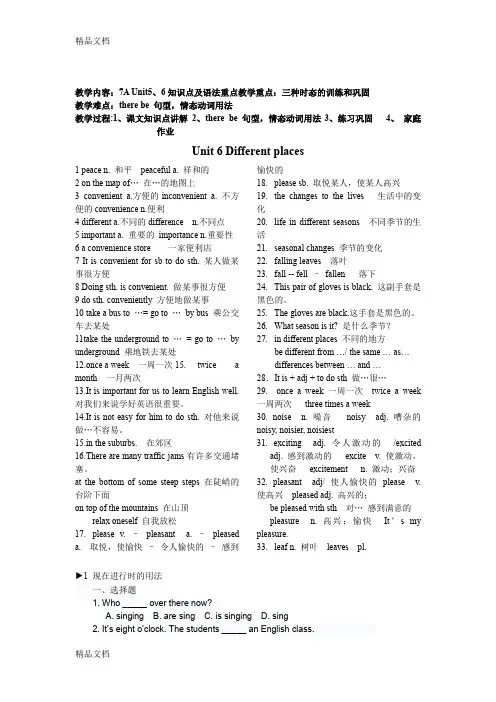
教学内容:7A Unit5、6知识点及语法重点教学重点:三种时态的训练和巩固教学难点:there be 句型,情态动词用法教学过程:1、课文知识点讲解2、there be 句型,情态动词用法3、练习巩固4、家庭作业Unit 6 Different places1 peace n. 和平peaceful a. 祥和的2 on the map of…在…的地图上3 convenient a.方便的inconvenient a. 不方便的convenience n.便利4 different a.不同的difference n.不同点5 important a. 重要的importance n.重要性6 a convenience store 一家便利店7 It is convenient for sb to do sth. 某人做某事很方便8 Doing sth. is convenient. 做某事很方便9 do sth. conveniently 方便地做某事10 take a bus to …= go to …by bus 乘公交车去某处11take the underground to …= go to …by underground 乘地铁去某处12.once a week 一周一次15. twice a month 一月两次13.It is important for us to learn English well. 对我们来说学好英语很重要。
14.It is not easy for him to do sth. 对他来说做…不容易。
15.in the suburbs. 在郊区16.There are many traffic jams有许多交通堵塞。
at the bottom of some steep steps 在陡峭的台阶下面on top of the mountains 在山顶relax oneself 自我放松17. please v. –pleasant a. –pleaseda. 取悦,使愉快–令人愉快的–感到愉快的18. please sb. 取悦某人,使某人高兴19. the changes to the lives 生活中的变化20. life in different seasons 不同季节的生活21. seasonal changes 季节的变化22. falling leaves 落叶23. fall -- fell –fallen 落下24. This pair of gloves is black. 这副手套是黑色的。
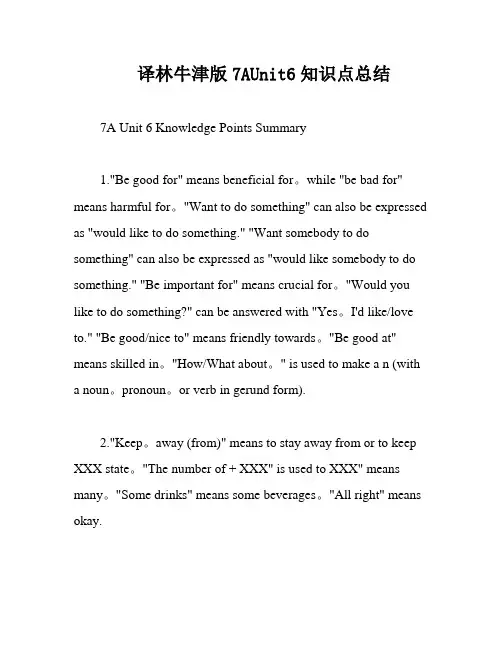
译林牛津版7AUnit6知识点总结7A Unit 6 Knowledge Points Summary1."Be good for" means beneficial for。
while "be bad for" means harmful for。
"Want to do something" can also be expressed as "would like to do something." "Want somebody to do something" can also be expressed as "would like somebody to do something." "Be important for" means crucial for。
"Would you like to do something?" can be answered with "Yes。
I'd like/love to." "Be good/nice to" means friendly towards。
"Be good at" means skilled in。
"How/What about。
" is used to make a n (with a noun。
pronoun。
or verb in gerund form).2."Keep。
away (from)" means to stay away from or to keep XXX state。
"The number of + XXX" is used to XXX" means many。
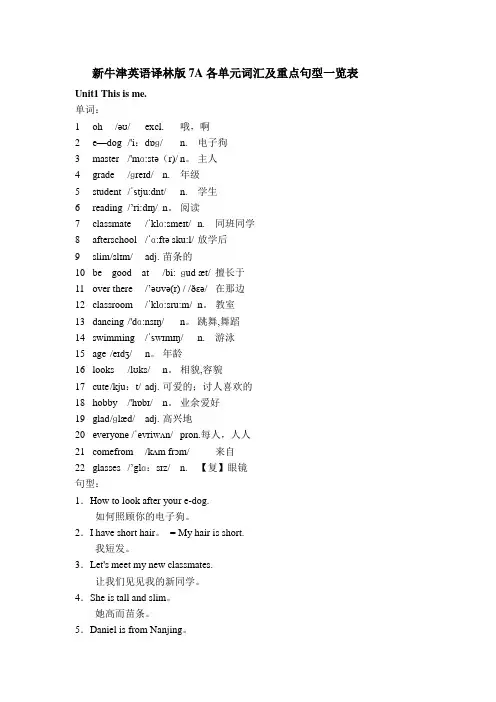
新牛津英语译林版7A各单元词汇及重点句型一览表Unit1 This is me.单词:1 oh /əʊ/ excl. 哦,啊2 e—dog /'i:dɒɡ/ n. 电子狗3 master /'mɑ:stə(r)/ n。
主人4 grade /ɡreɪd/ n. 年级5 student /ˈstju:dnt/n. 学生6 reading /’ri:dɪŋ/n。
阅读7 classmate /ˈklɑ:smeɪt/ n. 同班同学8 afterschool /ˈɑ:ftə sku:l/ 放学后9 slim /slɪm/ adj. 苗条的10 be good at /bi: ɡud æt/ 擅长于11 over there /’əʊvə(r) / /ðεə/ 在那边12 classroom /ˈklɑ:sru:m/ n。
教室13 dancing /'dɑ:nsɪŋ/n。
跳舞,舞蹈14 swimming /ˈswɪmɪŋ/n. 游泳15 age /eɪdʒ/ n。
年龄16 looks /lʊks/ n。
相貌,容貌17 cute /kju:t/ adj. 可爱的;讨人喜欢的18 hobby /'hɒbɪ/ n。
业余爱好19 glad /ɡlæd/ adj. 高兴地20 everyone /ˈevriwʌn/ pron.每人,人人21 comefrom /kʌm frɔm/ 来自22 glasses /’glɑ:sɪz/ n. 【复】眼镜句型:1.How to look after your e-dog.如何照顾你的电子狗。
2.I have short hair。
= My hair is short.我短发。
3.Let's meet my new classmates.让我们见见我的新同学。
4.She is tall and slim。
她高而苗条。
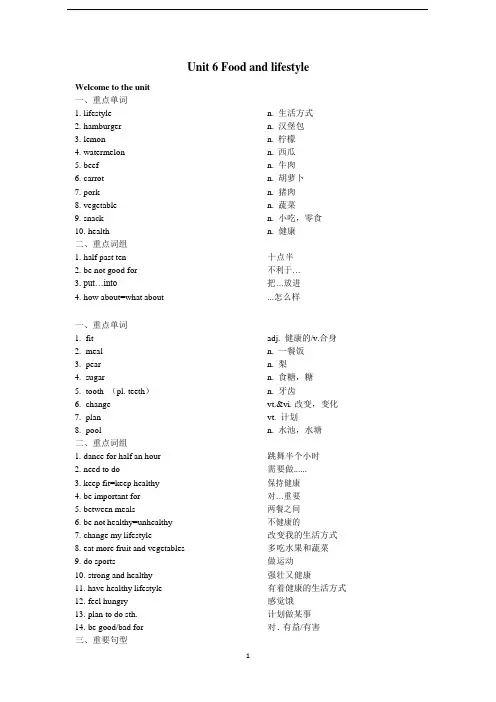
Unit 6 Food and lifestyleWelcome to the unit一、重点单词1.lifestyle n. 生活方式2.hamburger n. 汉堡包3.lemon n. 柠檬4.watermelon n. 西瓜5.beef n. 牛肉6.carrot n. 胡萝卜7.pork n. 猪肉8.vegetable n. 蔬菜9.snack n. 小吃,零食10.health n. 健康二、重点词组1.half past ten 十点半2.be not good for 不利于…3.put…into把…放进4.how about=what about ...怎么样一、重点单词1.fit adj. 健康的/v.合身2.meal n. 一餐饭3.pear n. 梨4.sugar n. 食糖,糖5.tooth (pl. teeth)n. 牙齿6.change vt.&vi. 改变,变化7.plan vt.计划8.pool n. 水池,水塘二、重点词组1.dance for half an hour 跳舞半个小时2.need to do 需要做......3.keep fit=keep healthy 保持健康4.be important for 对…重要5.between meals 两餐之间6.be not healthy=unhealthy 不健康的7.change my lifestyle 改变我的生活方式8.eat more fruit and vegetables 多吃水果和蔬菜9.do sports 做运动10.strong and healthy 强壮又健康11.have healthy lifestyle 有着健康的生活方式12.feel hungry 感觉饿13.plan to do sth. 计划做某事14.be good/bad for 对. 有益/有害三、重要句型11.An apple a day keeps the doctor away! 一天一个苹果,医生远离我!2.Healthy food is important for me. 健康的食物对我来说很重要。
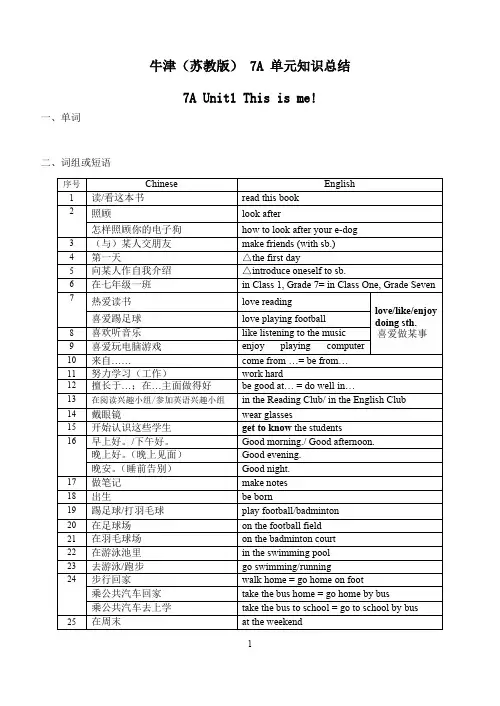
牛津(苏教版) 7A 单元知识总结7A Unit1 This is me!一、单词二、词组或短语序号Chinese English1读/看这本书read this book照顾look after2怎样照顾你的电子狗how to look after your e-dog3(与)某人交朋友make friends (with sb.)4第一天△the first day5向某人作自我介绍△introduce oneself to sb.6在七年级一班in Class 1, Grade 7= in Class One, Grade Seven热爱读书love reading7喜爱踢足球love playing football8喜欢听音乐like listening to the music9喜爱玩电脑游戏enjoy playing computergames love/like/enjoy doing sth.喜爱做某事10来自……come from …= be from…11努力学习(工作)work hard12擅长于…;在…主面做得好be good at… = do well in…13在阅读兴趣小组/参加英语兴趣小组in the Reading Club/ in the English Club 14戴眼镜wear glasses15开始认识这些学生get to know the students早上好。
/下午好。
Good morning./ Good afternoon.晚上好。
(晚上见面)Good evening.16晚安。
(睡前告别)Good night.17做笔记make notes18出生be born19踢足球/打羽毛球play football/badminton20在足球场on the football field21在羽毛球场on the badminton court22在游泳池里in the swimming pool23去游泳/跑步go swimming/running步行回家walk home = go home on foot乘公共汽车回家take the bus home = go home by bus24乘公共汽车去上学take the bus to school = go to school by bus 25在周末at the weekend26放风筝fly a kite/ fly kites27在上午/下午/晚上in the morning/ afternoon/ evening 28带某人去散步take sb. for a walk遛狗take the dog for a walk与某人谈话talk to/with sb.29谈论某事talk about sth.30为黄河足球队效力play for Huanghe Football Team 31为我们校足球队进球得分score for our school football team 32进球得分score goals33看起来很强壮/高兴(系表)look strong/ look happy听起来很好(系表结构)sound great34在下一次世界杯in the next World Cup35和他人合作work with others36用英语说…(某事)say sth. in English说英语speak English37……的答案the answer to …38半小时half an hour39将某物遗忘在某地△leave sth. sp.40练习做某事△practice doing sth.41需要做某事△need to do sth.三、重点句子1. What’s your name? My name’s…/ I’m…2.I love reading./ I l ove playing football after school./She loves dancing.3.I was born in Shanghai but I live in Beijing now.4.She works hard. 她学习/工作很努力。
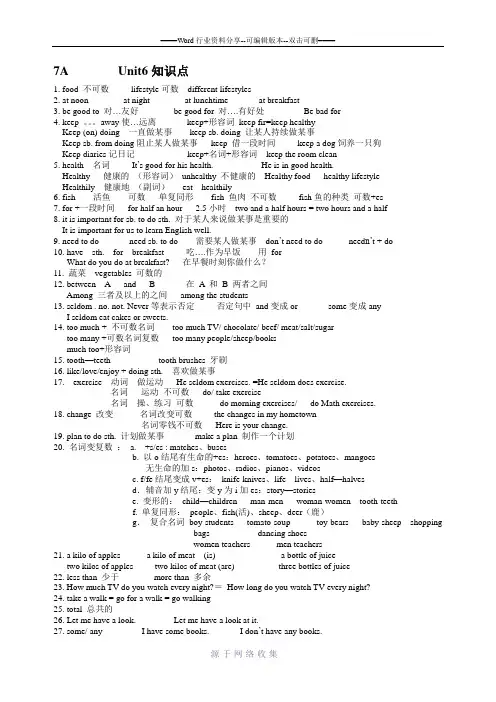
7A Unit6知识点1. food 不可数lifestyle可数different lifestyles2. at noon at night at lunchtime at breakfast3. be good to 对…友好be good for 对….有好处Be bad for4. keep 。
away使…远离keep+形容词keep fir=keep healthyKeep (on) doing 一直做某事keep sb. doing 让某人持续做某事Keep sb. from doing阻止某人做某事keep 借一段时间keep a dog饲养一只狗Keep diaries记日记keep+名词+形容词keep the room clean5. health 名词It’s good for his health. He is in good health.Healthy 健康的(形容词)unhealthy 不健康的Healthy food healthy lifestyleHealthily 健康地(副词)eat healthily6. fish 活鱼可数单复同形fish 鱼肉不可数fish鱼的种类可数+es7. for +一段时间for half an hour 2.5小时two and a half hours = two hours and a half8. it is important for sb. to do sth. 对于某人来说做某事是重要的It is important for us to learn English well.9. need to do need sb. to do 需要某人做某事don’t need to do need n’t + do10. have sth. for breakfast 吃….作为早饭用forWhat do you do at breakfast? 在早餐时刻你做什么?11. 蔬菜vegetables 可数的12. between A and B 在A 和B 两者之间Among 三者及以上的之间among the students13. seldom . no. not. Never等表示否定否定句中and变成or some变成anyI seldom eat cakes or sweets.14. too much + 不可数名词too much TV/ chocolate/ beef/ meat/salt/sugartoo many +可数名词复数too many people/sheep/booksmuch too+形容词15. tooth—teeth tooth brushes 牙刷16. like/love/enjoy + doing sth. 喜欢做某事17. exercise 动词做运动He seldom exercises. =He seldom does exercise.名词运动不可数do/ take exercise名词操、练习可数do morning exercises/ do Math exercises.18. change 改变名词改变可数the changes in my hometown名词零钱不可数Here is your change.19. plan to do sth. 计划做某事make a plan 制作一个计划20. 名词变复数:a. +s/es : matches、busesb. 以o结尾有生命的+es:heroes、tomatoes、potatoes、mangoes无生命的加s:photos、radios、pianos、videosc. f/fe结尾变成v+es:knife-knives、life---lives、half—halvesd.辅音加y结尾:变y为i加es:story—storiese. 变形的:child—children man-men woman-women tooth-teethf. 单复同形:people、fish(活)、sheep、deer(鹿)g.复合名词boy students tomato soup toy bears baby sheep shoppingbags dancing shoeswomen teachers men teachers21. a kilo of apples a kilo of meat (is) a bottle of juicetwo kilos of apples two kilos of meat (are) three bottles of juice22. less than 少于more than 多余23. How much TV do you watch every night?=How long do you watch TV every night?24. take a walk = go for a walk = go walking25. total 总共的26. Let me have a look. ----------Let me have a look at it.27. some/ any I have some books. ---I don’t have any books.Do you have any books? Would you like any books?28. The soup tastes good. The flowers smell nice. You look happy. I feel glad.The idea sounds good. The sweater touches good.He is looking happily at the dog.29. to do 作后置定语进一步说明I have lots of homework ____________. (do)There is a good place____________(play) football.to do 表示目的I want to have a pen________(write) words.I will have a party_________(celebrate) your birthday.30 help sb. do/ to do/ with sth. 帮助某人某事Could you help me with my English?31. start/ begin to do sth. 开始做某事32. give sb sth. = give sth to sb. 给某人某物buy sb sth= buy sth for sb.33. energy 能量不可数too much energy be full of energy34. the whole afternoon= all the afternoon。
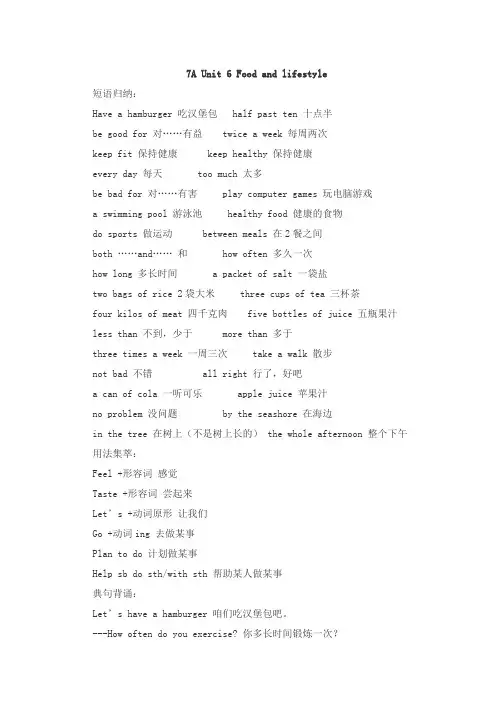
7A Unit 6 Food and lifestyle短语归纳:Have a hamburger 吃汉堡包 half past ten 十点半be good for 对……有益 twice a week 每周两次keep fit 保持健康 keep healthy 保持健康every day 每天 too much 太多be bad for 对……有害 play computer games 玩电脑游戏a swimming pool 游泳池 healthy food 健康的食物do sports 做运动 between meals 在2餐之间both ……and……和 how often 多久一次how long 多长时间 a packet of salt 一袋盐two bags of rice 2袋大米 three cups of tea 三杯茶four kilos of meat 四千克肉 five bottles of juice 五瓶果汁less than 不到,少于 more than 多于three times a week 一周三次 take a walk 散步not bad 不错 all right 行了,好吧a can of cola 一听可乐 apple juice 苹果汁no problem 没问题 by the seashore 在海边in the tree 在树上(不是树上长的) the whole afternoon 整个下午用法集萃:Feel +形容词感觉Taste +形容词尝起来Let’s +动词原形让我们Go +动词ing 去做某事Plan to do 计划做某事Help sb do sth/with sth 帮助某人做某事典句背诵:Let’s have a hamburger 咱们吃汉堡包吧。
---How often do you exercise? 你多长时间锻炼一次?---Less than 3 times a week. 一周不到三次。
牛津英语7A知识点汇总一.Welcome to unit 11. e—dog an e-mail2. What’s your name? My name is… / I’m…3. how to look after your e—dog.怎么照看你的电子狗4. make friends with sb.5. introduce sb. to sb. introduce oneself6. each other 相互7. welcome to s.p. welcome home/back8. help sb. do sth. help sb. to do sth.help sb. with sth.9. What does Millie say to Kitty? say sth. to sb.10. Let’s meet them. Let sb. do sth.二.Reading1. What class are you in? I’m in Class 1 Grade 7.2. I live in + 某地3. I’m in the Reading Club = I’m a member of the Reading Club.4. I was born in Shanghai.我出生于上海5. I love playing football after school.love doing sth. love to do sthplay + 球类play the + 乐器6. come from / be fromWhere do you come from?=Where are you from?7. I like listening to music.8. work hard 工作/学习努力认真9. be good at doing=do well in doing10. He wears glasses wear表戴眼镜、手表等饰品wear a smile 面带笑容11. enjoy doing sth.enjoy oneself = have fun = have a good time12. He is polite and helpful.13. 注意三单形式am/are — is do — does have — has14. 词汇play badminton / football / volleyballbadminton court basketball court volleyball court football field三.Grammer1.一般现在时用法、结构、伴随状语、频度副词、三单形式变化规则。
教学内容:、知识点及语法重点教学重点:三种时态的训练和巩固教学难点:句型,情态动词用法教学过程、课文知识点讲解、句型,情态动词用法、练习巩固、家庭作业. 和平. 祥和的…在…的地图上.方便的. 不方便的.便利.不同的.不同点. 重要的.重要性一家便利店. 某人做某事很方便. . 做某事很方便. 方便地做某事……乘公交车去某处……乘地铁去某处一周一次. 一月两次. 对我们来说学好英语很重要。
. 对他来说做…不容易。
. 在郊区有许多交通堵塞。
在陡峭的台阶下面在山顶自我放松. . –. – . 取悦,使愉快–令人愉快的–感到愉快的. . 取悦某人,使某人高兴. 生活中的变化. 不同季节的生活. 季节的变化. 落叶. –落下. . 这副手套是黑色的。
. .这手套是黑色的。
. ? 是什么季节?. 不同的地方… … …… ….做…很…. 一周一次一周两次. . 噪音. 嘈杂的, ,. . 令人激动的. 感到激动的.使激动,使兴奋. 激动。
兴奋. 使人愉快的. 使高兴. 高兴的。
对…感到满意的. 高兴。
愉快’.. . 树叶.►现在进行时的用法一、选择题. ?. . . .. ’ ’. .. . . .. ! .. . . .. ! .. . . .. ’ . .. . . . . . . .. . .. ?. . .. .. . . .. .. . .. .. . .. .. . .. , .. . . .二、填空:. () .. . () .. ! () . () .. () ?. () . ! () .►掌握引导时间状语从句的用法►学会运用引导的原因状语从句►句型用法汇总报告结构是英语中陈述事物客观存的常用句型,表示“有”,其确切含义是“存在”作为引导词,本身没有意义,用动词的某些形式作为谓语动词,它的主语是用一些表示泛指或不定特指的名词词组,动词和主语的数必须一致。
句子最后通常为表示地点和时间的状语。
因此要表达“某个地方或某个时间存在什么事物或人”的时候常用“名词地点(时间)这一句型。
7AU6知识点梳理七年级上册第六单元主要围绕日常生活中的各种活动和爱好展开,涵盖了丰富的词汇、语法和句型。
接下来,让我们对这一单元的知识点进行详细梳理。
一、词汇1、与活动相关的名词football 足球swimming 游泳drawing 绘画dancing 跳舞reading 阅读walking 散步2、动词play 玩;踢;打like 喜欢go 去enjoy 享受;喜欢3、形容词great 好极的;美妙的fun 有趣的4、其他often 经常sometimes 有时二、语法1、一般现在时表示经常发生的动作或存在的状态。
主语+动词原形/动词第三人称单数形式例如:I often play football He likes swimming注意动词第三人称单数形式的变化规则,一般在动词后加 s 或 es。
2、行为动词的一般疑问句及回答Do +主语+动词原形+其他?回答:Yes, 主语+ do / No, 主语+ don'tDoes +主语(第三人称单数)+动词原形+其他?回答:Yes, 主语+ does / No, 主语+ doesn't例如:Do you like reading? Yes, I do / No, I don'tDoes he go walking sometimes? Yes, he does / No, he doesn't3、频率副词often 经常, usually 通常, sometimes 有时, never 从不频率副词通常放在实义动词之前, be 动词、助动词、情态动词之后。
三、句型1、 I like playing football (表达喜欢做某事)2、 She enjoys dancing (enjoy + doing sth 喜欢做某事)3、Do you often go swimming? (一般疑问句询问是否经常做某事)4、 He doesn't like drawing (否定句)四、重点短语1、 play football / basketball 踢足球/打篮球2、 go swimming 去游泳3、 read books 看书4、 walk to school 步行去上学五、语言运用在实际交流中,能够运用本单元所学的词汇、语法和句型来谈论自己和他人的爱好及日常活动。
1.A. lazy—hardworking; interesting – boring;light—heavy; black—white;first—last; short—long;left—right; cheap—expensive;light—dark; early—late;up—down; small—big;with—without; sad—happy;B. color n.—colorful adj. fashion n. –fashionable adj.final adj. –finally adv. suit n. – suit v. – suitable adj.2. can 和may 都用来请求别人的许可, can 一般是请求朋友的许可,而may 一般是请求长辈的许可。
can的肯定、否定回答是Yes, …can. No, …can’t. may的肯定、否定回答分别是:Yes, …may. No, …can’t/ may not.eg. Can you give us your ideas? 你可以告诉我们你的观点吗?May I ask you to help us raise the money? 我可不可以请你帮我募捐一些钱?A.can的用法(1)表示能力,相当于be able to,释为“能、会”,如:The boy can swim now. I can’t tell the story in English.(2)表示许可,在疑问句中相当于may,但不如may正式,礼貌,见本课。
Can适用于多种人称,may适用于第一人称。
(3)表示可能,常见于否定句、疑问句The boy in red can’t be Tom. Tom is tall.**Fire can be dangerous. (表示客观推测)B.may的用法(1)表示许可,常用于第一人称。
如:--May I go right now? --Yes, you may. No, you can’t / may not.May I …? 常用于征求许可,肯定应答常用Yes, you may. Yes, please. Certainly.否定回答常用No, you can’t. No, you may not. Please don’t. No, you mustn’t.(语气强烈,表示“绝对禁止”);(2)表示可能,常用于肯定句。
如:--Where is Mr. Gu? –He may be in the office.***may be 可能是(主观推测);can be可能是(客观推测);[maybe adv. 可能] must be 一定是;can’t be不可能是3. Welcome to our fashion show.Welcome to 地点; Welcome to do sth.(1).欢迎到中国来。
Welcome to China.(2).欢迎到我家。
Welcome to my home.(3).欢迎来参加我的生日晚会。
Welcome to my birthday party.(4).欢迎加入我们。
Welcome to join us.(5).欢迎和我们一起旅游。
Welcome to go on a trip with us.4. We are having the show because we want to raise money for Project Hope.raise: 1. 募集 2. 饲养 3. 举起(1.初三年级希望为那个可怜的孩子募集钱。
Grade Three wishes to raise money for that poor child.(2.他们正在为贫穷地区的孩子募集书。
They are raising books for children in poor areas.(3.Lily 饲养了三只猫一只狗。
Lily raises three cats and a dog.(4.请举手!Please raise your hand!5. Look, here comes Simon.本句是倒装句。
主语和谓语是句子的核心,它们之间有两种语序:一是主语在谓语之前称为自然语序;二是主语在谓语之后则称为倒装语序。
而倒装语序中又有全部倒装和部分倒装两种情况。
首先,在全部倒装的句子中,要把整个谓语放在主语的前面去而构成倒装语序。
如本句。
另外,在部分倒装的句子中,只把谓语的一部分(如情态动词、助动词、或是系动词be)放到主语的前面去,构成倒装语序。
例如:Where did you buy the dictionary, in the book store nearby or in Xinhua bookstore?当there, here, then, now等副词在句首,且谓语是come, go, be 等动词时,句子一般要全部倒装。
其意义在于引起他人的注意。
如果这类句子的主语是代词,则不用写成倒装句。
•这个故事是这样的。
•Now, here goes the story.•瞧,出租车过来了。
•Look, there comes the taxi.•然后又一个问题提出来了。
•Then comes another question.•现在轮到你了。
•Now comes your turn.•给你。
•Here you are.•她来了。
•There she comes.6. •She is wearing a yellow cotton blouse and a pair of blue jeans. / She is wearing a black wool skirt, long red leather boots and a red silk blouse.限定描绘大长高,形状年龄和新老;颜色国籍跟材料,作用类别往后靠.其中,“限定词”包括:冠词、物主代词、指示代词、或数词,它位于各类形容词前。
它本身分为三位,即:前、中、后。
前位限定词有all、half、both、分数和倍数;中位限定词有冠词、指示代词、物主代词等;后位限定词有基数词和序数词,但序数词位于基数词前。
如:both my hands、all half his income等。
“描绘”性形容词如:beautiful、bad、cold、great 等。
“大长高”表示大小、长短、高低等一些词。
表示“形状”的词如:round square等。
“国籍”指一个国家或地区的词。
“材料”的词如:wooden, woolen, stone,silk等。
“作用类别”的词如:medical, college,writing desk,police car等。
a small round table; a tall gray building; a dirty old brown shirta famous German medical school;an expensive Japanese sports car7. Look, how beautiful Sandy is!感叹句通常有what, how引导,表示赞美、惊叹、喜悦、等感情。
what修饰名词,how 修饰形容词,副词或动词。
感叹句结构:感叹部分+主谓部分!感叹句结构主要有以下几种:How +形容词+ 陈述语序!How+副词+ 陈述语序!What+a+形容词+单数名词+ 陈述语序!What+ 形容词+复数名词+ 陈述语序!What+ 形容词+不可数名词+ 陈述语序!•他是一个多么可爱的男孩!•How clever a boy he is! •What a clever boy (he is)!•多么可爱的小婴儿!•How lovely the baby is! •What a lovely baby it is!•他们是多么强壮啊!•How strong they are!•我们有着多么棒的主意呀!•What wonderful ideas (we have)!•天多冷呀!•How cold it is! •What cold weather it is!•Kitty跑的多快呀!•How fast Lily runs!8. She is wearing her hair in a 1990s style.(1)Wear:穿; 戴着, 佩, 留着(胡须等)...wear a red jumper;wear a watch on his hand;wear a pair of glasses on his face;wear her hair in a 2060s style;wear a pair of black boots in a 1790s style;wear her hair in a ponytail.(2)the 1980s二十世纪八十年代; the 1890s十九世纪九十年代; the 1350s十四世纪五十年代(3)wear“穿着”,表示状态;put on“穿上”,表示动作;dress“穿衣”,后跟表示人的宾语,dress sb“为某人穿衣服”;dress up 装扮、打扮;be in穿着…(衣服)She is wearing a white dress.It’s cold outside. Put on your warm coat.Little Tom isn’t old enough to dress himself.Mr. White usually dresses her daughter in red.She looks pretty in a white dress.9. That’s all for today’s fashion show.that's all for … ……就(讲)到这里。
•今天的课就讲到这里.•That’s all for today.•今天关于为贫困地区的孩子募集钱的讲话就到这里.•That’s all for today’s talk on raising money for children in poor areas.•今天的电影就放到这.•That’s all for today’s film.10. Today we are going to show you clothes from the 1970s to the 1990s.show sth. to sb. (=show sb. sth.),意为―把某物给某人看‖,show后接的是双宾语,指人的sb为间接宾语,指物的sth为直接宾语。